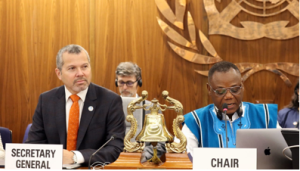
20 OCT 2025
After four days of increasingly tense and fraught negotiations at the MEPC plans for a global carbon levy on shipping have been postponed.
The member states of the International Maritime Organization (IMO) have voted to delay adoption of the Net Zero Framework after strong opposition from the US and Saudi Arabia.
Ahead of today’s vote US President Trump had weighed into the debate expressing outrage over the planned global carbon pricing mechanism. The US has been pressurising smaller member states with tariffs, port fees, and blocking of vessels calling ports in the States if they supported framework.
According to social media reports Saudi Arabia sought a one-year delay by way of vote.
The IMO said that 57 countries voted in favour of a delay, 49 against a delay and 21 abstained. 8 member states were not present for the vote. “The extraordinary session of the Committee is adjourned for one year,” it said.
Speaking at media briefing after the close of the MEPC meeting and commenting on the delay in adoption of the NZF Arsenio Dominguez, Secretary-General of the IMO said, “It’s [NZF] very much alive. The decision to taken today was to adjourn the extraordinary session that was convened to adopt the amendments for one year. And as was clarified by the chair that next week the intercessional working group will meet and they have a work plan that was discussed and agreed and will continue to move forward.”
Asked if it the delay would impact the IMO he said, “I don’t see it as blow to the organisation and I want to make that clear and there is a lot of work that comes out from IMO and I think we have demonstrated that for over 50 years.”
The Secretary General also acknowledged the wider geopolitical pressures that were at play during the meeting. “It wasn’t the normal meeting of IMO. But this is topic that transcends IMO, the geopolitics in the world right now makes it as well more challenging to make progress on certain topics but I will maintain that member states have the right to express their opinion, to negotiate among each other. I’m not here to qualify that, I’m here to continue to work with all of them.”
The original entry into force for the NZF would have been in March 2027 if the framework had been approved at the extraordinary meeting of the MEPC. This timeframe will now be reviewed.
The International Chamber of Shipping (ICS) which has pushed for a carbon fund for a number of years expressed its disappointment at the delay.
Thomas A. Kazakos, ICS Secretary General, said: “We are disappointed that member states have not been able to agree a way forward at this meeting. Industry needs clarity to be able to make the investments needed to decarbonise the maritime sector, in line with the goals set out in the IMO GHG strategy.
Independent tanker owner representative group Intertanko was more positive hoping the extra time could result in a better framework. Intertanko Managing Director Tim Wilkins said: “This gives us time to improve the single regulatory maritime framework to cut maritime emissions. Let’s use this opportunity to work collaboratively to tackle the ambiguities and concerns of the NZF raised by Intertanko Members.”
However, it also noted that “It is unclear what the path forward is since the positions are more polarised.”
The International Association of Ports and Harbours (IAPH), which supports the NZF said it was a major setback as the industry needs the legal certainty it would provide to make investments in decarbonisation. IAPH managing director Patrick Verhoeven commented: “Only IMO can provide such a framework. We don’t know what this adjournment will lead to, but we fear it will simply open the door for more national and regional measures, which will add to an already complex regulatory patchwork resulting in unintended consequences.”
The Global Maritime Forum which represents many of the companies and organisations that have been frontrunners in decarbonisation for shipping said the delay would make meeting the industry’s emission targets more challenging.
Related:Cost of energy transition higher without IMO Net Zero Framework
“Today’s adjournment is a disappointing setback for shipping, but not the end of this journey. The adjournment for a full year creates serious challenges for meeting the timelines in the Net-Zero Framework agreed in April and will make delivery of the sector’s decarbonisation targets even more challenging.” Jesse Fahnestock, Director of Decarbonisation at the Global Maritime Forum.
Environmental pressure groups were also not surprisingly disappointed in the outcome.
Teresa Bui, Senior Climate Campaign Director, Pacific Environment, said: “Delaying the vote on the International Maritime Organization’s Net Zero Framework is frustrating and a betrayal of the world’s most vulnerable nations. We urge IMO member states to adopt the Framework as soon as possible.”
“By delaying adoption of its Net Zero Framework, IMO has today squandered an important opportunity to tackle global shipping’s contribution to climate breakdown”, said John Maggs, the Clean Shipping Coalition’s Representative at the IMO. “With climate warming impacts being felt everywhere on Earth, kicking this decision down the road is simply evading reality.